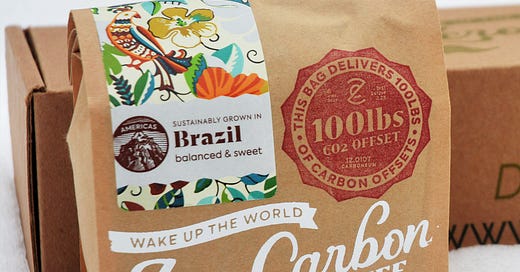Entrepreneurs bringing food brands to market that draw carbon from the atmosphere
The 2d Edition of the Negative Foods Newsletter
This is not the newsletter covering all the solutions for saving the planet (see here), or the newsletter about investing in regenerative agriculture (see here), or the newsletter about regenerative agriculture practices (see here).
This newsletter covers the food brands that are based on regenerative farming practices and that draw carbon from the atmosphere. Specifically, we’ll celebrate the entrepreneurs bringing carbon negative foods to market.
In last week’s product review I introduced to you the terrific founder of Belcampo, Anya Fernald. This week let’s shine the spotlight on three others:
Matt Plitch’s startup Neutral is bringing milk that’s carbon neutral (also local and organic) to Pacific Northwest consumers. Neutral’s carbon footprint is made neutral by partnering with dairy farmers that capture and transform cow’s methane emissions into renewable energy. Click here to hear Matt describe it.
Julia Collins startup Moonshot Snacks relies on regeneratively sourced grains to create carbon neutral crackers. Moonshot buys organic stone-milled heirloom wheat from Hedlin Family Farms. I recommend Moonshot’s terrific blog post regarding regenerative sourcing.
Sylwia Tabor’s startup Carnivore Snax only sources ingredients from regenerative farms, such as White Oaks Pastures, “storing more carbon in the soil than their cows emit”. My kids LOVE LOVE LOVE Carnivore Snax! I recommend giving it a try.
I salute these audacious entrepreneurs. They are sticking their necks out to bring food brands to market with carbon neutral or negative footprints. Join me in supporting them!
But what about you? I need you to send me your ideas. What food brands have carbon negative footprints? What entrepreneurs are doing the hard work? Post in the comments below please, or reach out to me directly. I’ll highlight them in future editions of this newsletter.
Your Feedback: What’s the Beef with Beef?
After last week’s edition of this newsletter, Mark Barnett (an attorney who is co-chair of Foley Hoag’s Energy & Climate Group) told me that his 16 year old son has become a “total carnivore,” so he loved reading about great options such as Belcampo.
But other readers expressed surprise that I cheerfully highlighted a meat company. Isn’t meat bad for the climate? Aren’t cattle an inefficient use of food growing capacity (we chop down rain forests to grow grains to feed to cows)? Don’t cows release a huge amount of greenhouse gasses? This will be a topic for a future newsletter. I do think meat is often bad for the environment, at least the way most Americans eat it. But eating a modest amount of meat produced with a regenerative supply chain can be good for the environment and the climate. As Dr. Mark Hyman put it, it’s the “how, not the cow”. I get frustrated with dogmatic views that such things are binary (all good or all bad).
Product Review: Zero Carbon Coffee
Let’s talk about another complex topic: Food brands made carbon neutral with the purchase of offsets. For about three months now, my wife and I have been enjoying coffee, we get shipped from the Bronx, called Zero Carbon Coffee. The coffee is Brazilian, and it is delicious. and it is “Climate Neutral Certified,” which is “the label earned by companies that offset and reduce all of their greenhouse gas emissions.” We buy 5 lb bags of “Balanced and Sweet - Daterra, Brazil”.
So it seems we are enjoying coffee that tastes good, that wakes me up early to write this newsletter, and that is carbon neutral. But are offsets as good as the elimination of emissions? This will also be a topic for a future newsletter, and I’d love to hear your thoughts on this topic in the comments below.
For your further consideration:
President Biden, in his address last week to congress, said “Farmers, farmers planting cover crops so they can reduce the carbon dioxide in the air and get paid for doing it.“
Mark Hyman Podcast: Are Cows the Cause or Cure for Climate Change?
Can Eating Cows Save the Planet?
https://www.zerocarboncoffee.com/
230,000 Acres of Tropical Rainforest Protected as Biodiversity Hotspot For Jaguars in Belize



